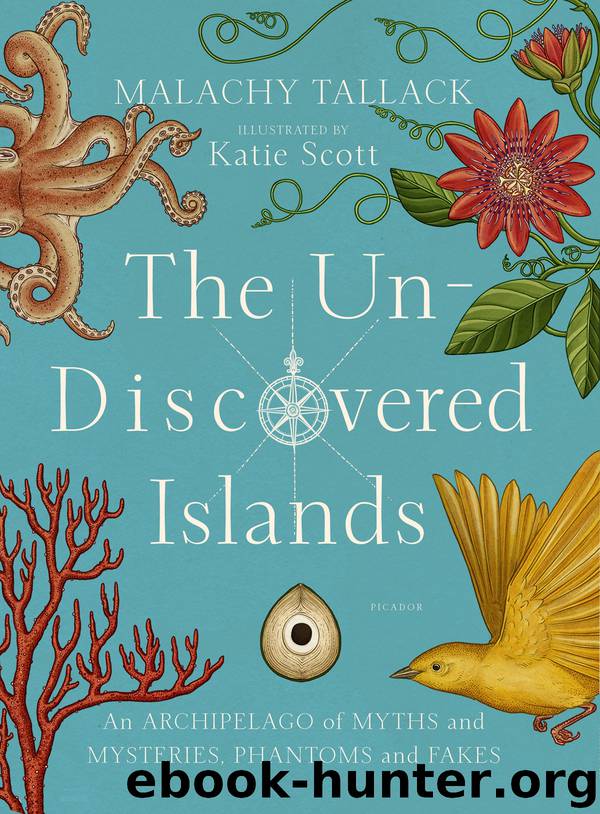The Un-Discovered Islands by Malachy Tallack & Katie Scott

Author:Malachy Tallack & Katie Scott
Language: eng
Format: epub
Publisher: Picador
Published: 2017-10-13T04:00:00+00:00
Critias provides a great deal of information, not just about the geography and politics of the island, but about the architecture of its capital city, the design of its irrigation ditches and the characteristics of its ritual sac-rifices. Timaeus, on the other hand, concerns itself with the final, key elements of the story: the bloodthirsty Atlanteans were defeated by the warriors of Athens. Then the island itself was destroyed in a single day and night, by earthquake and by flood, along with Athens itself.
The story of Atlantis is not presented within the dialogues as being fiction. Quite the opposite: it is told as though it were historical fact. But that does not mean that it is historical fact. Even leaving aside the mythological elements of the tale – and, also, the sheer impossibility of what is described – it is difficult to avoid the conclusion that what we are dealing with is elaborate allegory, not ancient history.
But that has not stopped people claiming otherwise. A few early commentators – most notably Strabo, two thousand years ago – considered the possibility that the story might be true. But they were the exception. It was not until Europeans began to explore the American continents in the sixteenth century that the idea of Atlantis as geographical fact, or even as key to some deeper secret about the world, really began to take hold. Since then, hundreds of books have been published on the subject; television programmes and films have been made. This sunken island, which played only a minor role in Plato’s work, has risen to become an integral part of our cultural landscape.
Some of the speculation surrounding the Atlantis myth has been vaguely scientific. Researchers have attempted to tie the story to real geological events. Some have argued that the Minoan eruption, an enormous volcano that devastated the island of Thera – today’s Santorini – around 1600BC, provided the historical inspiration. Others have pointed to Doggerland, which once joined the east of the British Isles to mainland Europe, and which was finally submerged more than eight thousand years ago; or to Helike, a Greek city destroyed by a tsunami during Plato’s own lifetime.
But alongside these theories has been another, less credible but no less persistent, thread of investigation. Though the claims are diverse, the central idea is generally this: Atlantis, wherever it was located, was the birthplace of civilisation, and a lost utopia. In the words of Ignatius L. Donnelly, whose 1882 book The Antediluvian World is certainly one of the most influential of its kind, Atlantis was once home to ‘a great, wise, civilized race’. A few of these people migrated to Egypt, to Europe, to North and South America, and carried with them their technology – including writing – as well as stories of their kings and queens, who came in time to be thought of as gods. Later, a great flood drowned the island and its people. That flood was the same one described in the Bible and in other, similar stories on both sides of the Atlantic.
Download
This site does not store any files on its server. We only index and link to content provided by other sites. Please contact the content providers to delete copyright contents if any and email us, we'll remove relevant links or contents immediately.
Learning SQL by Alan Beaulieu(6282)
Weapons of Math Destruction by Cathy O'Neil(6268)
Digital Minimalism by Cal Newport;(5751)
iGen by Jean M. Twenge(5409)
Sapiens by Yuval Noah Harari(5366)
The Age of Surveillance Capitalism by Shoshana Zuboff(4282)
Elon Musk by Ashlee Vance(4122)
Thing Explainer by Randall Munroe(3932)
Apollo 8 by Jeffrey Kluger(3707)
Future Crimes by Marc Goodman(3595)
The Science Book (Big Ideas Simply Explained) by DK(3278)
The Innovators: How a Group of Hackers, Geniuses, and Geeks Created the Digital Revolution by Walter Isaacson(3172)
Who Can You Trust? by Rachel Botsman(3131)
I Live in the Future & Here's How It Works by Nick Bilton(2995)
Infinite Energy Technologies by Finley Eversole(2977)
Steve Jobs by Walter Isaacson(2892)
Dawn of the New Everything by Jaron Lanier(2770)
Chernobyl by Serhii Plokhy(2536)
Ben Franklin's Almanac by Candace Fleming(2527)
